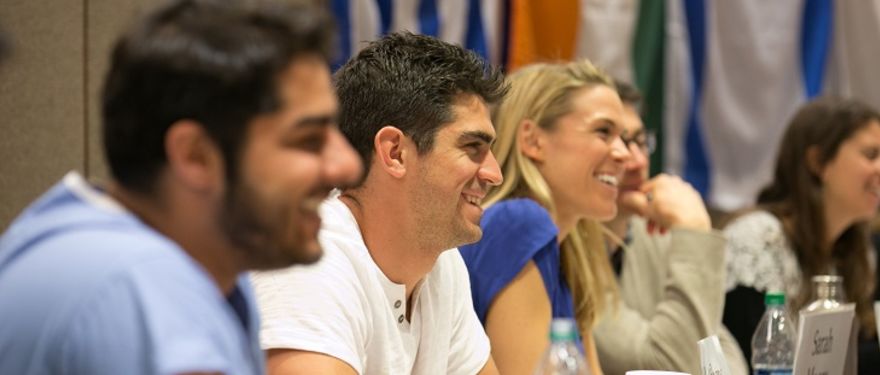The JD/MBA Program is the oldest of the joint degree programs at Harvard. A four year offering, students begin the first year at either HBS or HLS, spend the second year at the other school, and then take courses at both institutions during their final two years.
Students may apply to both schools concurrently, or apply
during the first year of study at either HLS or HBS. Because of the flexibility
of the program, it typically attracts a diverse set of students interested in
business, law, and public service.
Tian Feng and Zach Sokoloff are both third years in the program and are here to answer some questions about their experiences. Tian hails from Texas, has worked in finance, and started at HBS - while Zach taught with Teach for America in his hometown of Los Angeles prior to beginning at HLS.
Why did you want to pursue the joint JD/MBA degree?
Zach: I had always been drawn to law school, both because it appealed to my intellectual passions and would provide rigorous critical thinking training. However, after spending one year as a teacher in an LA public school, I realized that having exposure to and experience in business would be a boon to someone interested in returning to public service. The combination of degrees allows JD/MBA students to be thinkers and doers, giving us the tools to work through challenging problems and implement effective, timely solutions.
Tian: Similar to Zach, I wanted to build some perspective and experience. Working in trading taught me first how interconnected law and business can be, and second how important it is to understand problems from both perspectives. One of the great things about the program is getting the opportunity to explore the same issues from different angles.
How are the two schools the same? How are they different?
Tian: Both schools feature amazing, enthusiastic peers and top-notch teaching. Both of the first year curricula take place in U-shaped classrooms where a 80-90 student section attends most of its classes together, allowing everyone to learn more about and appreciate their classmates. However, HBS focuses mainly on case discussions where a conversation between the students is guided by the faculty. We're often challenged to step into the shoes of the protagonist and debate open-ended options. In contrast, HLS employs more of a Socratic method, where a professor poses questions to the class and engages individual students in their answers. Our fellow students can also be very different; it's fascinating debating the same questions in the two schools.
Zach: To echo Tian, the two schools attract bright, ambitious, personable students. However, HBS typically draws students who have several years of work experience, whereas the HLS population skews a bit younger. Further, the HBS experience is inherently a social, team-oriented process. From discussion groups to FIELD, HBS students are constantly working with others. HLS, on the other hand, tends to place a bit more focus on individual academic pursuits, and through opportunities like research assistant roles and practice-based learning, the school enables students to deeply investigate the aspects of the law that appeal to them. The schools seem to borrow from one another though; HLS is incorporating the Problem Solving Workshop into the 1L curriculum, and HBS is looking to develop a program that resembles law school clinics.
What do you plan to do after graduation?
Zach: One truly remarkable aspect of the JD/MBA program is the diversity of careers that students pursue upon graduation. For me, my time as a teacher left an indelible mark on my professional aspirations. I'd like to return to those same low income communities to help spur economic development, working to create public spaces of commerce and communion, and empowering residents to play a part in shaping this transformation.
Tian: Another great thing about the four year program is the opportunity to explore a variety of different experiences. While I am still looking to figure out post-graduation plans, the last two years have allowed me three very different experiences: working abroad, in the public sector, and with a start-up.
What would you like prospective students to know about the program?
Tian: There is no specific career path that the JD/MBA degree sets you upon, no job opportunity that is open only to both degrees. At the end of the day, it's a transformative four-year experience where you're challenged in the way you think.
Zach: Having the JD/MBA community has fundamentally shaped my time at Harvard. The group represents a collection of the most passionate, dynamic students on campus. These are individuals who buck the paradigms at both schools and carve out their own path, making the program slightly different for all that enroll. In that sense, I think the JD/MBA can appeal to a broad range of prospective students, with any number of interests. However, it is a demanding program, particularly in the final two years when students take on a combined course load. In that sense, those considering the JD/MBA ought to feel strongly about attending both HBS and HLS on their own before committing to the four-year dual degree.

